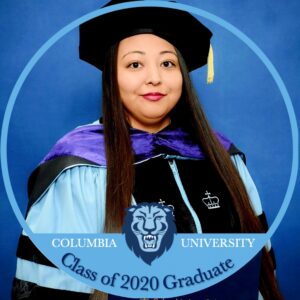
- Details
- By Mikayla Steele
Mari Hulbutta, a star student and Citizen of the Chickasaw Nation of Oklahoma, graduated May 20 from Columbia Law School. Hulbutta grew up in a suburb just north of Oklahoma City, and has known for years she was destined for a career in law. “I always knew law was in the backdrop,” she said in a video interview on Columbia Law School’s website. “I became aware of this idea throughout Indian country of a ‘briefcase warrior,’ which is the modern-day warrior that a lot of Native people pursue whenever they pursue a career in law.”
After graduation, Hulbutta said she will join Sheppard, Mullin, Richter & Hampton intellectual property litigation practice group in Century City, Calif., as an associate. She will also work with the firm’s Native American law practice group.
In 2013, as an undergrad, she was awarded the UDALL Congressional Award for Native American students. The award gave her the opportunity to meet with Native People who held positions of power, governing the relationships with the federal government and tribes. Through this opportunity she met former Chickasaw Nation Lt. Gov. Jefferson Keel and Assistant Chief of the Seminole Nation Lewis J. Johnson.
During Hulbutta’s time in Columbia, she was closely engaged with the Native American Law Student Association, serving as its president. According to the Chickasaw Times, in March 2019, she guided a group of classmates through a week of service and cultural awareness in Chickasaw Country.
In her Chickasaw Times interview, Hulbutta said, “It’s been a real treat to be able to bring students from across the United State and even from around the world to the Chickasaw Nation.”
Hulbutta also worked alongside Bernard Harcourt, a Columbia Law professor of political science, on research surrounding the Standing Rock protests. Through that, she helped draft briefs on behalf of Native Americans and non-Natives who were impacted by unconstitutional actions.
More Stories Like This
Native News Weekly (August 25, 2024): D.C. BriefsUS Presidents in Their Own Words Concerning American Indians
Native News Weekly (December 14, 2025): D.C. Briefs
Wounded Knee Massacre Site Protection Bill Passes Congress
Two Murdered on Colville Indian Reservation
Help us defend tribal sovereignty.
At Native News Online, our mission is rooted in telling the stories that strengthen sovereignty and uplift Indigenous voices — not just at year’s end, but every single day.
Because of your generosity last year, we were able to keep our reporters on the ground in tribal communities, at national gatherings and in the halls of Congress — covering the issues that matter most to Indian Country: sovereignty, culture, education, health and economic opportunity.
That support sustained us through a tough year in 2025. Now, as we look to the year ahead, we need your help right now to ensure warrior journalism remains strong — reporting that defends tribal sovereignty, amplifies Native truth, and holds power accountable.
 The stakes couldn't be higher. Your support keeps Native voices heard, Native stories told and Native sovereignty defended.
The stakes couldn't be higher. Your support keeps Native voices heard, Native stories told and Native sovereignty defended.
Stand with Warrior Journalism today.
Levi Rickert (Potawatomi), Editor & Publisher
